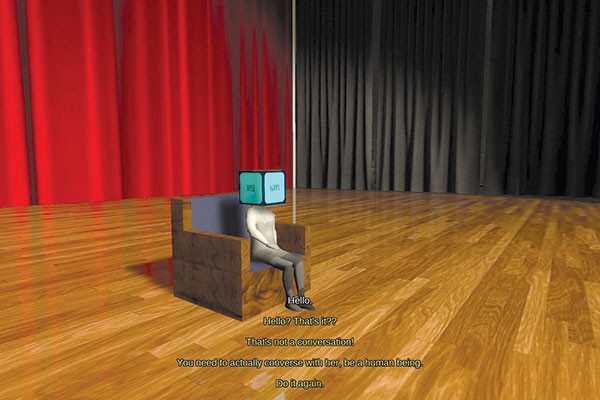Rating: 4/5
Far from being a digital introductory handbook for any new students, The Beginner’s Guide is hard to describe. That is not surprising, given that it is from the creators of the excellent Stanley Parable, a sadomasochistic journey into unreliable narration. The Beginner’s Guide, by contrast, is a game about videogames, presented in the form of a patchwork series of smaller incomplete games and narrated by its real-life creator, Davey Wreden.
The Beginner’s Guide belongs to the walking simulator genre of games (think Dear Esther with slightly more interactivity). The fractured story contained herein is of a game designer and ex-friend of Wreden’s named Coda, who started designing many games between 2008 and 2011 but never finished any. They range from very simplistic first-person shooters (which lack any enemies or even a reload function) to platformers that are deliberately unfinishable. Most of them could simply be called absurd art pieces, but the only element they share is their incompleteness. Wreden acts as a tour guide through each of the games, explaining their subtleties and how they provide a glimpse into Coda’s mind, for better or for worse. None of these games are difficult in any way. It is impossible to die, there is exactly one puzzle repeated a few times for narrative purposes, and there is very little for you to do except walk down every linear corridor and do exactly what the game tells you.
To begin by describing a few things that I don’t like about The Beginner’s Guide, it almost shoots itself in the foot with how short it is. It is barely two hours long. Given its narrative framework of a number of short games – the first of which is a static reskin of a Counter Strike map – one could easily presume that all of these levels were made randomly and then strung together in an order that happened to make sense. It is also not nearly as clever as the cohesive experience that was The Stanley Parable. While The Stanley Parable explored the element of choice in videogames and demanded multiple playthroughs, the few choices in The Beginner’s Guide are completely illusory and give the game little replay value at all. It feels like a step backwards as far as Davey’s self-aware, post-modern storytelling style goes.
So why am I awarding this game four out of five stars? Because this is a game about depression. It is about the weight of the self-hatred, self-deception and self-expression that can accompany creative stagnancy and feelings of worthlessness. It is about wallowing, and how difficult it is under any circumstances to drag oneself out of a negative rut. Most importantly, however, it is about the companions of the depressed, who project themselves unhealthily onto their friends without even realizing they’re doing it. They subconsciously work against their friends’ recovery and self-betterment for the sake of feeling like they’re helping someone.
While introspective and thought-provoking, the commentary is occasionally rather ham-handed. Some of the games fall into the ridiculous and the blasé, such as one that requires you (as Coda) to reveal all of your darkest fears to prevent a giant door from crashing into a spaceship, or another where you take on the role of an insecure motivational speaker delivering a lecture in a classroom right next to a flaming vortex. As such it feels like it is on the cusp of revealing some very wise insight about depression, but doesn’t quite hammer it home in the same way that The Stanley Parable does. That game was essentially about depression too, and in a much more brutal and confrontational – yet also self-parodying – manner. Fortunately, none of this makes The Beginner’s Guide any less worthy of your time.
It may not be worth the full price for its short length, but it is definitely worth getting The Beginner’s Guide the next time a Steam sale rolls around. This game is strongly recommended to anyone interested in non-conventional narrative games, or anyone who wants further reason to have a long, hard think about themselves.



